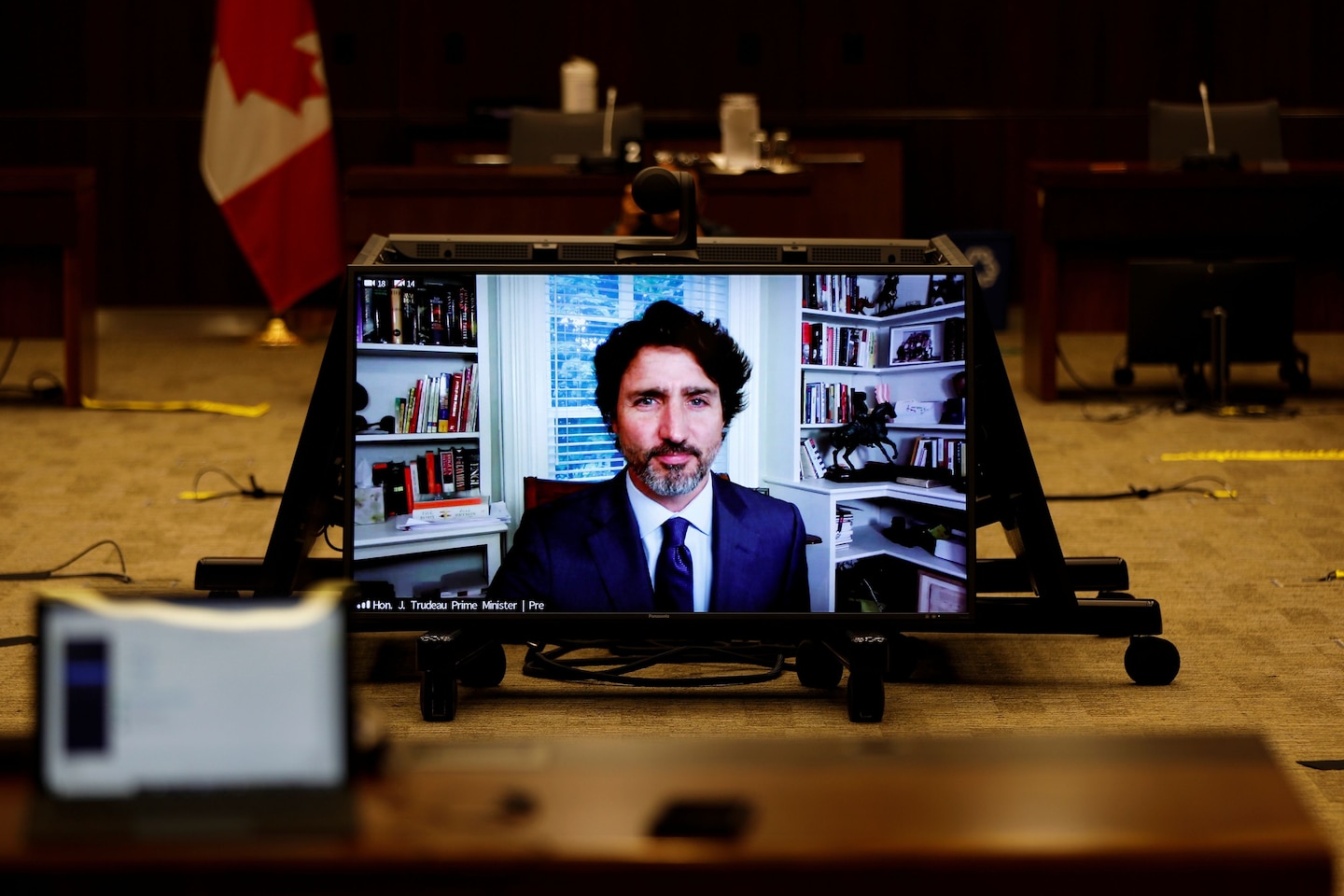Trudeau defends WE Charity deal in rare testimony before Parliament

Trudeau first announced the program, which would help students having trouble finding summer jobs during the coronavirus outbreak by paying them to volunteer in their communities, in April.
In his testimony Thursday, Trudeau said he did not learn that public servants were recommending that the Toronto-based WE Charity administer the program until a briefing before a cabinet meeting on May 8. He said he had “expected” that the Canada Service Corps, an existing government youth initiative, would manage the program, but was told it could not scale up to deliver it.
Trudeau, who has spoken at several WE Charity events, and whose wife, Sophie Grégoire Trudeau, is a WE “ambassador,” said he knew the selection of the charity would be “closely scrutinized,” so he took the proposal off the cabinet agenda and asked the public service to make sure “that all the i’s were dotted, all the t’s were crossed.”
When the decision went back before cabinet on May 22, Trudeau said, the public service said it was confident in its recommendation.
“In effect, they said that if we wanted this program to happen, it could only be with WE Charity,” he said. “The choice was not between providers. It was between going ahead with WE Charity to deliver the program or not going ahead with the program at all.”
Trudeau said Canada’s ethics watchdog has approved his wife’s work with the organization.
“As I said, I should have recused myself from this decision to avoid the appearance of favoritism,” he told the committee. “I know that appearances can harm a good program and, of course, that’s exactly what happened here.”
Trudeau responded to his questioners in both English and French. His appearance was interrupted briefly when the committee chair’s power went out.
Trudeau announced in June that WE Charity would be paid $14 million to administer the program. Critics, recognizing the organization’s links to his family, pounced.
Amid the swirling controversy, the agreement was dissolved, and the federal government said the program would be run by public servants instead. Canada’s independent ethics watchdog launched the probe of Trudeau.
Then media reports and testimony revealed that the charity and its for-profit arm had paid Trudeau’s mother, Margaret, and his brother Alexandre more than $220,000 to appear and speak at its events from 2016 to 2020, and covered more than $150,000 of their expenses.
Trudeau and Finance Minister Bill Morneau, whose family has its own ties to the charity, apologized for failing to recuse themselves from the cabinet discussions. But that hasn’t been enough to tamp down the controversy.
During Morneau’s turn in the hot seat last week, the finance minister told the committee that he had that morning cut a check to WE Charity for more than $30,000 in travel expenses incurred in 2017 when he and members of his family traveled with the organization to Kenya and Ecuador.
Morneau, who is also being investigated by the ethics watchdog, said he had realized only that week that he had not paid those expenses. He insisted it was always his intention “to pay the full costs of the trips” and offered another apology.
But WE Charity said the trips had been “complimentary.” In a news release, the organization said it occasionally invites potential donors on trips to see its work up close, and extended invites to Morneau and his wife because they were well-known philanthropists.
The government has offered inconsistent information about the youth grant program, and questions about its origins remain. After Trudeau announced the $14 million payout to WE Charity, news reports and testimony revealed that the agreement was with the WE Charity Foundation, an entity the organization says manages “legal liability,” and that it stood to receive up to $32 million.
Others in the charity sector have disputed the claim that only WE Charity could run the program. After a senior public servant testified that WE Charity had sent proposals for youth-related programs to cabinet ministers’ offices in April, before the program was announced, opposition lawmakers wondered whether political staffers put their thumbs on the scale.
WE Charity’s co-founders, brothers Craig and Marc Kielburger, defended themselves before the committee on Tuesday. Craig said neither he nor his brother had ever socialized with the Trudeau family, that the civil service initiated the program and that there was “no financial benefit” for the charity.
“WE Charity agreed to implement the Canada Student Service Grant not to be helped by government, but to help government and to help young people across Canada,” Craig Kielburger said during an often-adversarial four-hour hearing.
Trudeau, who campaigned on promises to bring “sunny ways” and transparency to government before he was elected prime minister in 2015, was rapped twice by the ethics watchdog for contravening conflict-of-interest laws during his first mandate. His Liberals lost their majority in the October election; he now leads a minority government.
The Kielburgers founded WE Charity as Free the Children in 1995. Its finances, real estate empire and governance model have come under scrutiny amid the controversy, prompting several sponsors to sever ties and raising questions about whether the federal government did its due diligence.
Trudeau said he regretted how “this has unfolded” and noted the other supports provided to students during the pandemic. “Unfortunately, the grant for volunteer service is unlikely to be a part of that package this summer, and that is something I regret,” he said.






